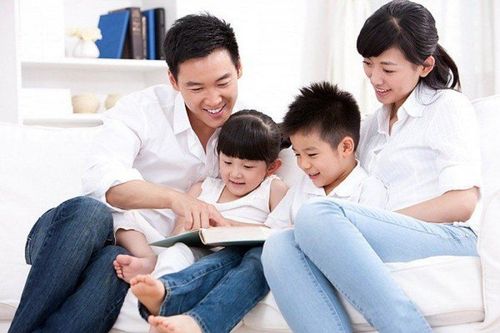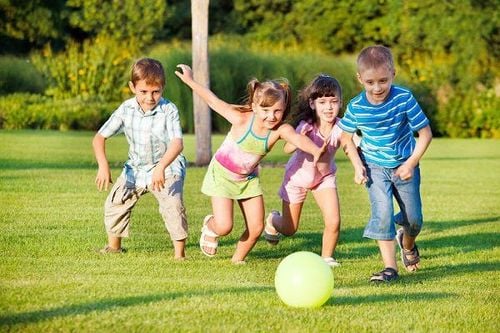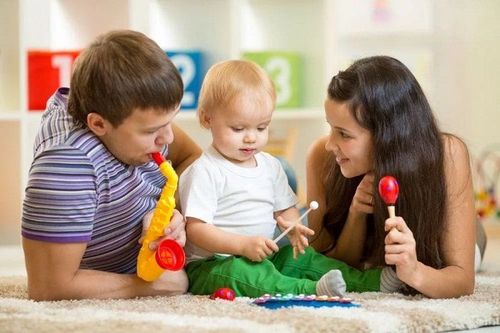This is an automatically translated article.
When you have kids, you're more likely to have socializing at a friend's house than at a restaurant, mall, or movie theater. But when you're at someone else's home, you'll likely have higher expectations for your child than you would at your own, especially if you're visiting friends who don't have children. To meet that expectation, you need to teach your child how to behave when going to someone else's house.1. Some notes to teach children how to behave when going to other people's houses to play
Set ground rules: Explain to your child when you go that you expect him to not step on furniture and not be allowed to run around the house. Give your child some information before going to someone else's house: It can be helpful to briefly talk to your child about what might happen during the visit: “Mom, dad, and two of us are going to sit in the living room and drink coffee. coffee, and you and your child will probably play in the family room.” Engage your child in an activity: If you're visiting a home without children, it's wise to bring along. something for your child to focus on, such as a book, mini-game, or coloring book Set individual cues with your child: You may want to set up a cue in advance to let your child know that a behavior vi is inappropriate and must be stopped. Show your baby that when you tug on his ear, it means stop. This way you can warn him without embarrassing him. Get out when necessary: If your child doesn't heed your warnings or really goes astray, you can take him outside for a jog around the yard before gently reminding him of your expectations. Keep out of reach of children dangerous objects: Look around the area where your child is going to check for possible breakers or hazards. If there are fragile items within reach of children, you can ask the landlord if they can be temporarily stored in a safer location. If there are too many things to put away, you can ask if everyone can sit outside or move to another room with less furniture that children can play with.
Bạn có thể thiết lập một tín hiệu trước để cho trẻ biết rằng một hành vi là không phù hợp và phải chấm dứt
2. Teach your child how to behave when going to other people's houses to play according to each age
The best way that parents can teach their children how to behave when going to other people's houses is to set a good example for their children to follow. At the same time, you also need to spend time teaching children skills when going out, teaching them polite greeting skills when visiting other people's houses.Do not assume that children are too young to neglect teaching them these rules, because once bad manners have become a habit of yours, it will be very difficult for you to correct them. Sayings like "Please", "Please", "Sorry", "Thank you", "Can I..." need to be taught as soon as the child is 2 or 3 years old.
Parents and all other family members need to actively guide the child to use the above phrases in the right situations. From there, children will form habits of polite behavior and speech. You should remember that you need to be really persistent and always be a role model for children to follow. On that foundation, you will easily guide your baby on how to be a valued guest.
2.1 Teach children how to behave when going to someone else's house to play for young children Young children often learn by imitating adults or other children. However, you should also pay attention to training your baby's ability to absorb new things, especially basic life skills such as playing skills. Because at this age, children can already understand and absorb what you convey.
First, focus on teaching your child polite phrases and expressions and of course you must always be a role model in everything you expect from your child.
Give praise when the child has good expressions such as greeting adults, asking permission before doing something, thanking when giving gifts or receiving favors for something. Do not assume that children are too young to ignore these rules, because most children can voluntarily say hello and thank you from a very young age.

Trẻ nhỏ thường học theo cách bắt chước người lớn hoặc những đứa trẻ khác
By age 4 , many children can learn some simple manners when going to someone else's house:
Understand and follow many of the rules in other people's homes - usually with some prompting from you. Understand and obey a nonverbal cue to stop doing something, but sometimes your child will get too excited to pay attention to your cues. Always remember to keep your feet off walls and furniture Limit running around the house, although your child will sometimes need your reminders Avoid touching fragile objects, especially if you remind them 2.2 Teach them manners when visiting someone's house other activities for children from 5 to 6 years old For children from 5 to 6 years old, it is necessary to know the following:
Children need to know how to wash their hands before eating Children can sit seriously at the dining table or at the guest table Children need to know how to speak thank and show thanks through actions and gestures Children need to know how to greet adults and know how to shake hands properly Children need to know how to arrange personal belongings, toys and other things in an orderly manner after being loan If the child needs to go to the toilet, the child should politely ask where the toilet is. And in the process of using, if there are any questions, the children know how to ask the owner to keep the cleanliness and avoid damaging the items. These skills are not difficult for children 5-6 years old. But children need to practice many times to be able to ingrained in their memory. You can take your child to someone else's house and pay attention to remind them to follow the above rules. Or sometimes, when guests come to your house to play, you can let your child play the role of the host so that he or she can better understand why it is important to have the right attitude when being a guest at someone else's house.
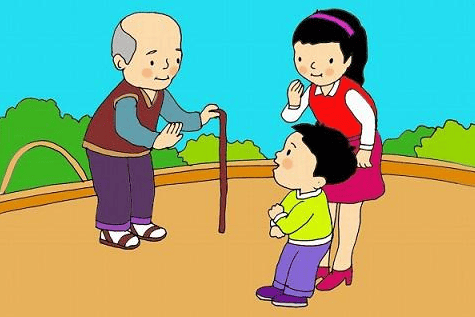
Trẻ 5-6 tuổi cần biết chào người lớn và biết bắt tay đúng cách
And remember, what you expect from your child can't happen overnight, it takes a lot of time. You should focus on specific lessons for each different age group, so that children can absorb and practice in the best way.
Key points to keep in mind when teaching children under 6 how to behave when visiting other people's houses:
Children aged 2 to 6 years need to learn basic behavioral skills; Depending on the specific time, you can focus on teaching your child the right skills. Parents need to be an example for their children to follow, not only as guests but also in their own homes. If you are a good example, your children will follow and progress very quickly; Keep calm when children make mistakes, and absolutely do not scold children in front of others, remind them privately so that they are not embarrassed and can absorb what you say in the best way. 2.3 Teach children how to behave when going to someone else's house to play for children aged 6 - 10 Basically, children between the ages of 6 and 10 need to know the following rules to be able to go to other people's houses to have fun Looks:
Children need to be able to say "I'm sorry", "Please", "Please", "Thank you"... competently and skillfully. Children need to know not to arbitrarily enter another person's room without permission. Children absolutely do not touch other people's personal things without that person's permission, even with things like wall pictures, decorations, display cabinets... Children are not allowed to arbitrarily taking food or drink from someone else's home; If the child feels hungry or thirsty, the child should politely ask the host. If your child is allowed to try a certain food or drink that he or she doesn't like, don't struggle or show any discomfort, but happily say, "Thank you, ma'am! I can't eat this!" . When sitting at the table, children need to chew slowly, do not open their mouth too wide when chewing, do not talk, whistle or sing while holding food in their mouth. Children need to get permission from the landlord before using the home's computer, telephone, or other home appliances or equipment. Children need to know that each family has its own rules, so respect the times when they need quiet, such as mealtime, bedtime. If a child is going out alone and feels uncomfortable or wants to go home, he or she needs to know how to ask the landlord's permission to call a parent to come pick him up. If children go with their parents, children should not coax to return, but they need to know how to ask their parents politely.
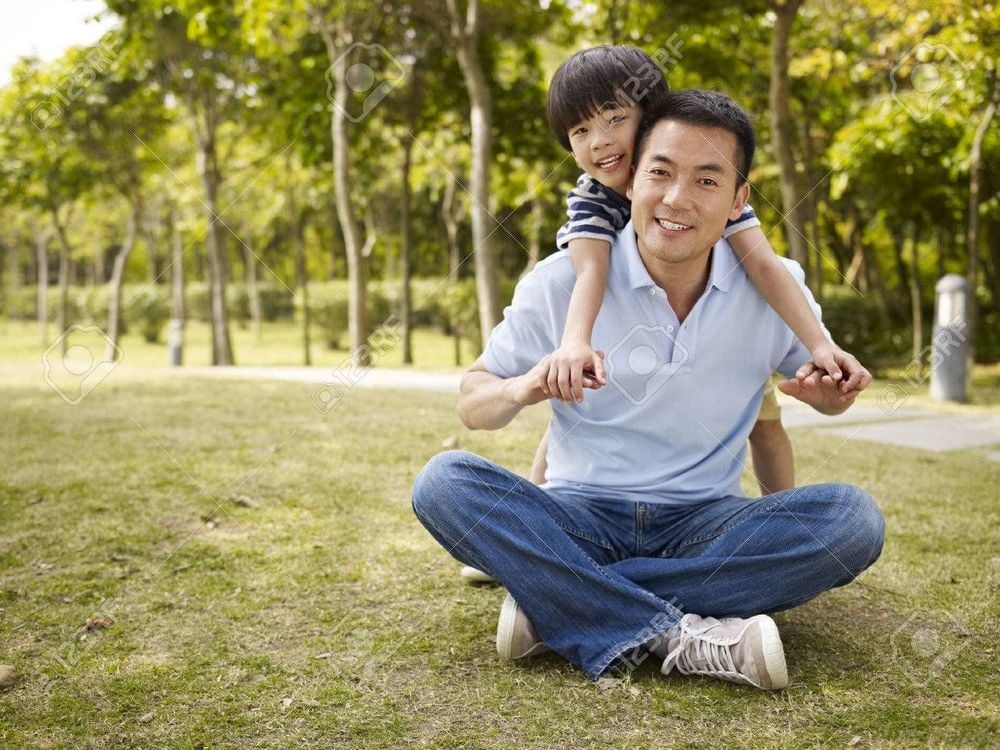
Về cơ bản, trẻ em trong độ tuổi từ 6 đến 10 cần phải biết các quy tắc sau để có thể đến nhà người khác chơi một cách vui vẻ
The main points to keep in mind when teaching manners to children aged 6 - 10 years old are:
Children need to know what to do and not to do when visiting someone's house, and these things you need to teach in advance. for children, don't wait until you've entered someone else's house to speak. Cooperate with the host in the families where the children come as guests to be able to correct, remind and teach the children in a timely manner. Spending the night in someone else's home takes a long time for a child to adjust. Therefore, you should not force your child to come play and sleep at someone else's house when he is not psychologically ready. 2.4 Teach your child how to behave when going to someone else's house for 11-13 year olds Children 11-13 years old can officially present themselves as a good guest and you have the right to be more strict in your requirements. behavior as well as punishment for children's mistakes. However, there are still many more lessons you need to teach your child at this age.
This is also the stage where a child gradually grows up and there will be a lot of situations that happen beyond your expectations when the child comes to play in someone else's house. Even the parents themselves, even if they understand the child's personality very well, cannot predict these situations and must always monitor to remind and guide the child. Children aged 11-13 need to know the following:
Children need to know how to knock before entering a room Children should always consult when entering any room in someone else's house, they may ask "Can I Can I come in?" If unfortunately encountering unexpected incidents, such as accidentally breaking something, children need to notify an adult as soon as possible, absolutely do not hide them in fear and especially not Blaming others When children want to leave the table, they should politely offer to help the host, such as washing the dishes themselves or cleaning the table If the child does not know the rules of the host family well , children should not be afraid to ask them for proper manners Children should respect the host's bedtime and turn off the lights when they go to sleep Children need to be kind to all members of the host family's family and pets their care When leaving someone else's house, children need to know how to say thank you for welcoming them. If your child has a brother or sister, he or she will have more opportunities to learn skills from his or her older sibling; Children can also learn from useful books. Learning how to behave as a valued guest is an important part of the social skills people need in life. You need to remember that all lessons need to be taken step-by-step and that it takes time for children to apply what they have learned.
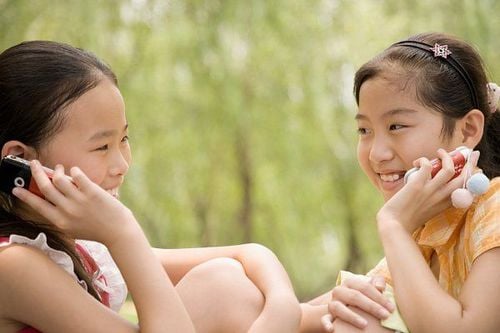
Trẻ từ 11 - 13 tuổi đã có thể chính thức thể hiện mình là một vị khách tốt
Talk to your child first about privacy, respect and appropriate manners; The social skills children learn now follow them into adulthood; Practice regularly with your children, if you have older children, let them participate in teaching your younger brother. Children often like to go out, like to be in a space with many people and participate in many activities... But children are children, they will most likely accidentally disturb those around them. Therefore, parents need to teach their children how to behave when going to other people's houses. That not only leaves a good impression in the heart of the host, but also makes them want to invite you and the child back in the next time.
Nurturing young souls is an extremely necessary job, however, parents should also note that children in the developmental stage are very susceptible to respiratory problems, infectious diseases. respiratory, skin diseases and gastrointestinal infections ... parents need to pay special attention to the care and provision of adequate nutrition for children. The pediatric department at Vinmec International General Hospital is the address for receiving and examining diseases that infants and young children are susceptible to: viral fever, bacterial fever, otitis media, pneumonia in children. With a system of facilities, modern medical equipment, sterile space, minimizing the impact as well as the risk of disease spread, Vinmec will bring satisfaction to customers. and is highly appreciated by industry experts with:
Gathering a team of leading pediatricians: Including leading experts with high professional qualifications (professors, associate professors, doctors, Master's degree), experienced, worked at major hospitals such as Bach Mai, 108.. The doctors are all well-trained, professional, conscientious, knowledgeable about young psychology. In addition to domestic pediatric specialists, the Department of Pediatrics also has the participation of foreign experts (Japan, Singapore, Australia, USA) who are always pioneers in applying the latest and most effective treatment regimens. . Comprehensive services: In the field of Pediatrics, Vinmec provides a series of continuous medical examination and treatment services from Newborn to Pediatric and Vaccine,... according to international standards to help parents take care of their baby's health from birth to childhood. Advanced techniques: Vinmec has successfully deployed many specialized techniques to make the treatment of difficult diseases in pediatrics more effective: neurosurgery - skull, stem cell transplant blood in cancer treatment. Professional care: In addition to understanding children's psychology, Vinmec also pays special attention to the children's play space, helping them to play comfortably and get used to the hospital's environment, cooperate in treatment, improve the efficiency of medical treatment.
Please dial HOTLINE for more information or register for an appointment HERE. Download MyVinmec app to make appointments faster and to manage your bookings easily.
Reference source: babycenter.com



